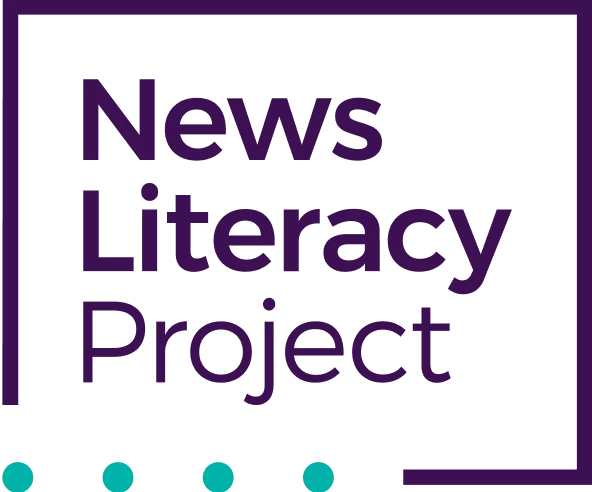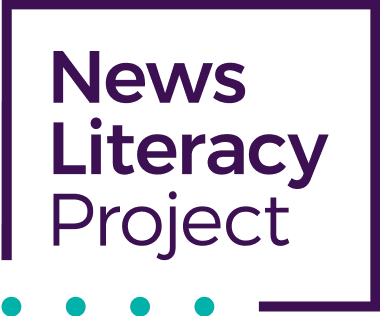Learn about our history, what news literacy is, why it matters and why nonpartisanship is vital to our work.
Founded in 2008, the News Literacy Project (NLP) is a nonpartisan education nonprofit that works with educators, school districts and states to ensure students receive news literacy instruction before they graduate high school. This instruction equips students to think independently, make informed decisions and actively participate in civic life.
Our organization was founded in 2008 by Alan C. Miller, a Pulitzer Prize-winning investigative reporter, after he visited his daughter’s middle school classroom to discuss what journalists do and why it mattered. He saw the value of having journalists share their experience and expertise in America’s classrooms. He went on to help create the foundations for the news literacy movement, bringing news literacy education to K-12 schools.
News literacy is the ability to determine the credibility of news and other information and recognize the standards of fact-based, high-quality journalism. It is an essential 21st–century skill, central to any media literacy, digital literacy or civics program.
Yes. Impartiality and fairness are values our leadership takes seriously. We work to stay nonpartisan and balanced in everything we do.
Our goal is to teach students how to judge news and information for themselves, not tell them what to think. When we create resources, we use examples that show different viewpoints and political positions. We also involve people with many different perspectives and experiences to serve as board members, lesson hosts and advisors.
Our educator materials reflect our values, including our Framework for Teaching News Literacy, a foundational document that guides our resource development.
We provide educators with free programs, resources and professional development to help them teach news literacy across disciplines and grade levels.
Our browser-based digital learning platform, the Checkology® virtual classroom, gives educators tools to teach news literacy to middle and high school students with topical and engaging lessons. Checkology teaches students how to identify credible information, seek out reliable sources and spot misinformation. Checkology users include educators in all 50 states, the District of Columbia and four U.S. territories.
We also help educators build their knowledge and skills to confidently teach news literacy, offering professional development through webinars and in-person sessions.
Our free weekly newsletter, The Sift®, offers classroom-ready lessons based on a rundown of the latest topics in news literacy — including trends and issues in misinformation, social media, artificial intelligence and journalism. Our monthly newsletter for families, Scroll Smarter, offers family-friendly tools to help your kids think more clearly about what they see online. Our annual National News Literacy Week, presented in partnership with The E.W. Scripps Company and USA Today, raises awareness of news literacy as an essential life skill. Throughout the week, we provide educators with resources to use in the classroom and suggest ways for the public to support the movement to teach news literacy.
News literacy helps students understand the importance of credible information and a free press in their lives and in a healthy democracy.
Media literacy generally refers to a broad discipline that promotes thinking critically about all “media messages” students encounter in their daily lives. This includes advertisements, news and entertainment, including films, scripted and unscripted television shows, music and video games.
Information literacy, which is related to library sciences, means being able to find, understand, and use information in a smart and responsible way.
Digital literacy is the ability to use technology and online tools effectively, safely and responsibly.
Since our earliest work in classrooms, assessing our impact has been a priority, and the results show that news literacy education improves students’ knowledge, attitudes and behaviors.
Each school year, we gather pre- and post-unit assessment data from students and educators who are using our Checkology Virtual Classroom.
During the 2024-25 school year, after completing Checkology lessons:
- 88% of students recognized when a social media post failed to provide credible evidence for a claim — a gain of 20 percentage points from pre-assessment.
- 82% of students identified the more credible of two articles on the same topic from two different sources — a gain of 23 percentage points from pre-assessment.
- 81% of students recognized the importance of a free press to a healthy democracy — a gain of 17 percentage points from pre-assessment.
Young people have inherited the most complex information landscape in history, and it is our responsibility as their caretakers and educators to ensure they can navigate it. A free and independent press and the public’s ability to determine whether information is credible are necessary for the future of a healthy democracy. The quality of information we consume has an impact on every decision we make in our daily lives, including our health care, finances and values. We can’t make well-informed decisions about our lives and our governance if we can’t agree on a shared set of facts.
Consider these findings from NLP’s recent report News Literacy in America: A survey of teen information attitudes, habits and skills (2024):
- Nearly half of teens surveyed think the press does more to harm democracy than protect it.
- Eight in 10 teens surveyed reported seeing posts on social media that spread or promote conspiracy theories, and of those, 81% said they were inclined to believe one or more of them.
- The majority of teens struggle to distinguish between different types of information, such as news, advertisements, opinions and entertainment.
Media organizations and journalists are essential partners in our work. More than 30 news organizations across the United States, from local outlets to internationally known print and digital publications, support NLP. They participate in our work in a variety of ways: publicly endorsing our mission, donating services or resources and promoting our major initiatives, such as National News Literacy Week. Individual journalists share their expertise through speaking engagements, as the hosts of Checkology® lessons and by joining dozens of fellow journalists as volunteers in our Newsroom to Classroom program, available to educators registered to use Checkology.
No. We teach students about the characteristics of credibility so that they can evaluate the trustworthiness of information regardless of the source. We aspire to help young people judge for themselves what to trust.
Some journalists who openly share their opinions as commentators, columnists, editorial cartoonists or editorial board members appear in select NLP resources. These resources cover opinion journalism and fact-based civic discourse, with the journalists’ roles clearly defined.
Such figures have also appeared in events sponsored by NLP, typically on panels that include both conservative and liberal commentators. Opinion journalists are an important part of our information ecosystem, contributing to civic discourse on current events and the political issues that shape our world.
We partner with a variety of organizations that share our values, whose missions align with ours and can help us reach a wider audience. We also partner with numerous school districts (ranging from New York City, Los Angeles and Chicago to smaller districts in South Carolina, Missouri, Indiana and elsewhere). Other past and current partners include:
National Council for the Social Studies (NCSS)
Older Adults Technology Services
Microsoft Flipgrid
Our financial support comes from a mix of corporations, foundations and individual gifts, as well as income we earn from our team members speaking at events or providing professional learning services. For a comprehensive list of NLP’s funders, visit our supporters page.
No. Like all organizations, NLP needs revenue to operate, but we are careful and discerning in the funding we accept. Before the start of a fiscal year, we decide on the projects and programs we plan to pursue. Prospective funders receive the descriptions and budgets for these offerings and choose which, if any, they might like to support. Their support does not enable them to make decisions or approve the content, resources and programs we produce. Check out our gifts acceptance policy.
Currently, NLP does not receive federal government funding, but we do regularly review the grant opportunities posted by the federal government, and if we were a fit for the eligibility criteria, we would consider applying. If we were to receive a federal grant, we would list it on our supporters page. NLP does provide its educational resources and professional learning workshops to publicly (taxpayer) and privately funded schools across the U.S. at no cost. If a school or school district, public or private, would like us to provide a custom educator training, we do charge a modest fee.



